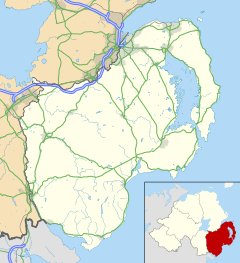Ballynahinch, County Down
Ballynahinch
|
|
|---|---|
 The Market House (middle) and Credit Union (left) |
|
| Ballynahinch shown within County Down | |
| Population | 5,364 (2001 Census) |
| District | |
| County | |
| Country | Northern Ireland |
| Sovereign state | United Kingdom |
| Post town | BALLYNAHINCH |
| Postcode district | BT24 |
| Dialling code | 028 |
| Police | Northern Ireland |
| Fire | Northern Ireland |
| Ambulance | Northern Ireland |
| EU Parliament | Northern Ireland |
| UK Parliament | |
| NI Assembly | |
Ballynahinch (from Irish: Baile na hInse, meaning "town of the island") is a town in County Down, Northern Ireland. It had a population of 5,364 people in the 2001 Census.
Ballynahinch was traditionally a market town, although the market still takes place in the square every Thursday. The town lies on the main A24 Belfast to Newcastle road 15 miles (24 km) south of Belfast. Facilities in the town include a leisure centre. In recent years a regeneration committee has been formed for the development of the town and the surrounding Spa and Drumaness areas.
Until the 17th century, the area was controlled by the McCartan clan. Around the mid-1600s, Patrick McCartan sold lands around Ballynahinch to Sir George Rawdon, agent to Viscount Conway, and Sir William Petty, a surveyor from Hampshire. Before his death in 1687, Petty leased his interest in the land leaving Sir George in sole possession. He built two corn mills and founded the town with a market square. In 1683 Charles II of England granted the town a patent to hold a Thursday market and two fairs every 1 February and 29 June. Settlers from lowland Scotland increased the population and Ballynahinch grew as a market town with the sale of livestock, corn, potatoes and increasingly, flax was being cultivated. Sir John Rawdon, descendant of Sir George and now the Earl of Moira took up residence in Montalto house in Ballynahinch. He made significant improvements to the estate and to the town by promoting the linen market and causing the market house to be built. By the end of the eighteenth century sales in the market were grossing around £300 per week and the town was prospering. Unfortunately it was about to suffer a setback.
...
Wikipedia

